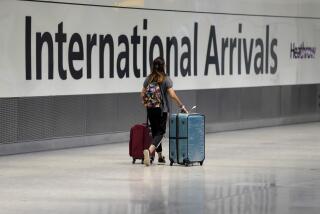Executive Travel : Exercise Caution When Traveling Abroad
- Share via
Passage of a new international trade agreement is likely to accelerate foreign travel by U.S. business people, many of whom have little experience abroad and could be particular targets for criminals ranging from pickpockets to kidnapers.
Foreign deals are already resetting company priorities. A recent American Express survey found that private companies now spend 13% of their travel and entertainment budgets abroad, up from 8% in 1990. The survey also showed that 40% of U.S. businesses now have overseas offices, compared to 35% in 1992. Even smaller companies--those spending less than $100,000 a year in travel--now spend more of it overseas. The survey showed 13% now have operations abroad, up from just 8% in 1992.
Yet most business people approach international travel with the same expectations of safety as they do in the United States, says John Morrison, director of risk management services for Paul Chamberlain International in Los Angeles, a security consulting firm. Although some places, such as Japan and parts of Europe, are safer than the United States, other destinations pose a greater risk of crime.
There are, however, some ways that travelers can increase their security.
The most important strategy for reducing the risk of attack, whether it’s aimed at grabbing you or your wallet, is to “maintain a circle of awareness,” Morrison says. Too often in public places, Morrison sees people talking on phones with their wallets and calendars out and their luggage strewn around. Keep all your bags close by you at all times, he says.
And this may sound like an echo from childhood, but travel in groups and don’t go anywhere with strangers if you can avoid it. If possible, arrange to have someone you know (or whose identity you can verify) from the company you are visiting, meet you at the airport. When making business appointments, always arrange to meet in a restaurant or other public location with people around. Don’t conduct business in hotel lobbies, however, because they are frequently targets of surveillance by criminals looking for “marks.”
*
Along with your circle of awareness, it’s important to keep as low a profile as possible, Morrison says. Make sure your luggage doesn’t have any flashy American symbols or flags, and don’t rent or drive a car that would draw attention. High-visibility executives should consider using assumed names when booking airline tickets to avoid broadcasting their travel itineraries to potential criminals, he says.
The same applies if you are traveling for a highly visible U.S. company, says Stacey Ravel Abarbanel, author of “Smart Business Travel--How to Stay Safe When You’re on the Road,” (First Books Inc., 1994). She recommends registering under an assumed corporate name if you are traveling in a country where your real company name might invite anti-American sentiments.
In the same vein, don’t carry your passport facing out in your front breast pocket or in your hand, she said. You don’t want people to be able to easily identify your citizenship.
Some American business travelers even carry fake passports with a pseudonym “documenting” their citizenship in a small country to present in the unlikely event of a hijacking or other terrorist act, she says.
It also pays to understand some local customs to avoid inadvertently offending anyone, she says.
Be aware as well that people eavesdrop on airplanes and may pick you out as someone with valuable corporate information or ties to a wealthy company, both of which could make you a potential target.
Ironically, one of the security pitfalls for Americans traveling overseas is that they tend to be friendly and engage people in conversation, inadvertently giving away sensitive information. Foreign criminals exploit this tendency for their own gain, advises the State Department’s Overseas Security Advisory Council in a booklet called “Security Guidelines for American Families Living Abroad.”
Habits are another thing they exploit. Try to change your travel patterns so you don’t leave your hotel or temporary residence at the same time every day. And change your travel route. It’s also smart to know some “safe havens” along your route, such as embassy or government buildings, police or fire stations, or hospitals. If you think you are being followed, get into one of your safe havens and request assistance. Also make sure you know how to use the public phones and carry the right coins to use them.
It can be helpful to register at the U.S. embassy or consular office when you arrive at your destination, because officials will be able to give you current security risks for the country in which you’re traveling. They can also assist in emergencies.
Abarbanel suggests learning some basic phrases such as, “Help,” “Police,” and “Where is a phone?” in the native language.
Also, note that hotel rooms are not secure. Avoid leaving important identifying information or valuables in your room or car. Lock your passport, money and any important business papers in a hotel safe-deposit box and carry a photocopy of your passport with you. The experts also say you should not tell a hotel clerk your movement plans for the day, and avoid discussing travel plans where they can be overheard.
*
More Executive Travel
* For tips on everything from laptop logistics to frequent-flier miles, check the Business Strategies section on the TimesLink on-line service. Sign on and “jump” to keyword “Business.”
Details on Times electronic services, B4
More to Read
Sign up for The Wild
We’ll help you find the best places to hike, bike and run, as well as the perfect silent spots for meditation and yoga.
You may occasionally receive promotional content from the Los Angeles Times.






